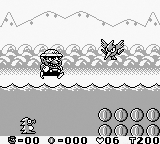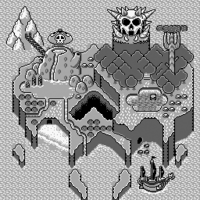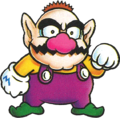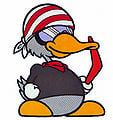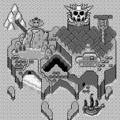Wario Land: Super Mario Land 3
This article is under construction. Therefore, please excuse its informal appearance while it is being worked on. We hope to have it completed as soon as possible.
Template:Infobox Wario Land: Super Mario Land 3, known in Japan as Super Mario Land 3: Wario Land (スーパーマリオランド3 ワリオランド), is a game released for the Game Boy. It was released in 1994. It is set apart from the first two Super Mario Land games in that it doesn't star Mario, and instead features Wario, launching him into his own Wario Land series. Mario does make a cameo at the end of this first Wario Land title, stealing the statue Wario worked so hard to collect. However, Wario does get his own house or castle (and at the highest amount, a whole planet) as a reward for saving Kitchen Island. The game is not only the final Super Mario Land title, but also the first game in the Wario Land series, in which Wario is the main hero, and goes on his own quests.
Plot
Desiring a castle of his own, Wario sets out to find a lost golden statue of Princess Toadstool that he intends to ransom to her for the money to buy his own castle. Along the way he gladly collects any other gold coins and treasures he finds. The game is spent navigating a number of levels to reclaim his lost treasures, and has a significant level of replayability due to the branched path many of the levels take.
Gameplay
Wario Land: Super Mario Land 3 is a 2D platforming game. It is divided into seven worlds, which each are divided into multiple courses. Once the player completes a course, the next course will become available, and so on. Unlike its sequel, Wario Land II, the game allows players to revisit levels that have already been completed.
Wario starts out on Rice Beach, a small area of Kitchen Island. On the map screen, the player will notice that Kitchen Island is shaped like a skull, and a skull theme is present throughout the game. The save points are skulls, as are the level exits, secret doors, etc.
Transformations
One of the main features in Wario Land is the various transformations that Wario can go through by getting items. These special powers can at times help Wario overcome obstacles and defeat tough enemies; However, if Wario takes damage when in any of the first three transformations, he will transform into Small Wario, who dies instantly upon taking damage.
| File:Bull Wario WL.png | Bull Wario – Wario can transform into Bull Wario by obtaining a Bull Pot or a Garlic Pot (in normal form). In this form, Wario can destroy his enemies and blocks much easier. Wario can also create a shock wave by crashing into the ground with his weight, and stick to the ceiling. |
|---|---|
| File:WL DragonWario.jpg | Dragon Wario – Wario transforms into Dragon Wario by obtaining a Dragon Pot. Upon obtaining the power-up, he wears a dragon-like helmet on his head, which allows him to momentarily spew fire from it. The fire works underwater as well, though instead of fire, the helmet shoots arrow-like projectiles. Unlike other forms, Wario cannot perform a body slam when wearing the hat. |
| File:Warioduck.PNG | Jet Wario – By obtaining a Jet Pot, Wario wears a plane-like helmet on his head, which allows him to glide for a while. He gradually descends until touching the ground, in which he can start walking again. Wario also walks more quickly and jumps higher with this item. |

|
Small Wario – Wario transforms into Small Wario if damaged. He is then not able to body slam, and taking more damage results in loss of a life. Small Wario can transform back into regular Wario by finding any of the four pots. |
Worlds
Bosses
Each world has a boss that Wario must defeat at the end. Here is a listing of the bosses in order, and which world they correspond to.
| Image | Name | World | Description |
|---|---|---|---|
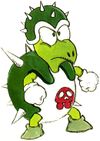
|
Toge Bro. | Rice Beach | Toge Bro. is a Bro. armed with spiky armor. In his fight with Wario, he employs a three-pronged attack of striking from land, air, and underground. His shell makes him invulnerable to ground pounds and fire. However, he can be rammed into, exposing his soft belly. After three hits to his vulnerable underside, he is defeated. |
| File:WL Bull.jpg | Beefne | Mt. Teapot | Beefne is immune to head stomps and ground pounds, due to his horns and thick hide. He attempts to destroy Wario by picking him up and throwing him into the lava below their battleground. To defeat him, Wario has to throw him into the lava instead. |

|
Hinyari | Sherbet Land | Hinyari is a large and bulky penguin that wields two vicious spiked boxing gloves, which he uses to menace Wario. He is immune to ground pounds, fire, and body slams, but Wario can hurt him by hitting his head. He then donns a spiked helmet, but Wario can simply knock it off with a slam and then attack the penguin. |

|
Funfun | Stove Canyon | Funfun is a giant stone head whose fighting style revolves around breaking blocks with his toungue, trying to get Wario to fall into a chasm, and spitting rocks. Funfun is immune to fire, coins, and ground pounds, but the rubble his attacks leave behind are picked up by Wario and thrown at him to defeat him. |

|
Bobo | SS Tea Cup | Bobo is a giant bird which sends out two Watches to attack Wario. He must jump on top of the wrench and toss at Bobo three times before Bobo is defeated. |

|
Zenisukii | Parsely Woods | Zenisukii can paralyze Wario and is immune to body slams, coins, and fire. Zenisukii also turns invisible and drops coins that transform into Yarikuri Obake to attack Wario. Wario can defeat Zenisukii by tossing his Yarikuri Obake minions at him. |
| File:WL Genie.jpg | Denpū | Syrup Castle | Denpū produces fireballs that chase Wario around. However, Wario can toss Denpuu's magic lamp so that it lands upright, producing a small cloud. Wario can ride this cloud and leap from it to pounce on Denpuu's head. The cloud then turns into a miniature version of Denpū that blasts lightning bolts, but the mini-Denpū is easily destroyed. After enough hits to the head, Denpū is defeated. |
Enemies
- Wanderin' Goom
- Pirate Goom
- Dropper
- Pinwheel
- Helmut
- Pouncer
- Penkoon
- Dangerous Duck
- Bucket Head
- Floater
- Pecan
- Watch
- Goboten
- Gaugau
- Konotako
- White Puff
- Guragura
- Yadorā
- Yarikuri Obake
- Pikkarikun
- Debidebi
- Fireballs
- Ukiwani
- Boulder
- Bē
- Chicken Duck
- Paidan
- Spiked Ball
- Muncher
- Togemaru
- Harisu
- Chikuri
- Paidan
- Maizō
- Yaburiki
- Bōtsu
Reception and Legacy
Reviews
Although it didn't sell as well as its Mario Land predecessors, the game received mostly favorable reviews. The game placed 71st in the 100th issue of Nintendo Power's "100 best Nintendo games of all time" in 1997.[1]
Sequels
The game spawned six sequels, Virtual Boy Wario Land, Wario Land II, Wario Land 3, Wario Land 4 and Wario Land: Shake It!. The Wario Land series also received Wario World and Wario: Master of Disguise which were similar games. A spin-off series was also made, the popular WarioWare series of games.
References in Other Games
A microgame called Wario Land is one of 9-Volt and 18-Volt's games in WarioWare: Smooth Moves. In it, the player has Wario hold a Pirate Goom and throw it at blocks, Togemaru, Pirate Gooms, Droppers and Debidebi.
When Wario defeats an enemy by throwing, a coin pops out. In the original game, coins only appear out of enemies when Wario shoulder bashes into them.
Artwork
Wario
- WARIOLOANDWARIO.PNG
- Wario folding arms WL.png
Wario folding arms
- Swimmingly 2.gif
Wario swimming
- Bull Wario WL.png
- Bull Wario holding Goom WL.png
Bull Wario holding a Pirate Goom
- WL DragonWario.jpg
- Warioduck.PNG
Bosses
- WL Bull.jpg
- Captain Syrup.png
- WL Genie.jpg
Enemies
- WL BucketHead.jpg
- WL Dropper.jpg
- WL Helmut.jpg
- WL Penkoon.jpg
- WL Pinwheel.jpg
- WL PirateGoom.jpg
- WL Pouncer.jpg
- Watch WL.png
Other
- Kitchen Island scene WL.jpg
Wario on Kitchen Island, artwork used for the box art
- WL Floater.jpg
The first Nintendo Power cover art of Wario
Trivia
- The game was tentatively titled Super Mario Land 3: Kairiki Wario (スーパーマリオランド3 怪力ワリオ). Kairiki Wario roughly means "Super Strength Wario." The name was used on a Japanese promotional flyer from 1993. The logo depicted on the flyer differs drastically from any of the Wario Land logos.[2]
- This game borrows some sound effects used in Metroid II: Return of Samus, another Nintendo game, also for the Game Boy. One example includes when a boss is hit, which is the same sound effect of when a Metroid gets hit. Another borrowed sound effect is when the player pauses the game.
References
External Links
| Wario Land: Super Mario Land 3 | |||
|---|---|---|---|
| Characters | Wario • Brown Sugar Pirates • Mario | ||
| Bosses | Spiked Koopa • Minotaur • Penguin • Devil's Head • Bobo • Ghost • Captain Syrup • Genie | ||
| Worlds | Rice Beach • Mt. Teapot • Sherbet Land • Stove Canyon • SS Tea Cup • Parsley Woods • Syrup Castle | ||
| Power-ups | Bull Pot • Dragon Pot • Garlic Pot • Jet Pot • Star | ||
| Collectibles | ? Block • 1 Gold Coin • 10 Gold Coin • 100 Coin • 3-Up Heart • Heart • Key • Treasure | ||
| Enemies and obstacles | Batto Shuruken • Bee Fly • Big • Bō • Bucket Head • Chicken Duck • D.D. • Demon Bat • Dropper • Floater • Gaugau • Goboten • Guragura • Harisu • Helmut • Knight • Konotako • Kōmori Missile • Lance • Maizō • Mine • Muncher • Paidan • Pecan • Penkoon • Pikkarikun • Pinwheel • Piranha Plant • Pirate Goom • Pouncer • Skewer • Sparky • Spiked ball • Togemaru • Ukiwani • Wanderin' Goom • Watch • White puff • Yadorā • Yarikuri Obake | ||
| Miscellaneous | Gallery • Glitches • Media • Pre-release and unused content • Staff | ||
| Game Boy games | |
|---|---|
| Super Mario franchise | Alleyway (1989) • Baseball (1989) • Super Mario Land (1989) • Golf (1989) • Dr. Mario (1990) • Super Mario Land 2: 6 Golden Coins (1992) • Donkey Kong (1994) • Mario's Picross (1995) • Picross 2 (1996) |
| Donkey Kong franchise | Donkey Kong (1994) • Donkey Kong Land (1995) • Donkey Kong Land 2 (1996) • Donkey Kong Land III (1997) |
| Yoshi franchise | Yoshi (1991) • Yoshi's Cookie (1992) • Tetris Attack (1996) |
| Wario franchise | Wario Land: Super Mario Land 3 (1994) • Wario Blast: Featuring Bomberman! (1994) • Wario Land II (1998) |
| Miscellaneous | Tetris (1989) • The Legend of Zelda: Link's Awakening (1993) • Game & Watch Gallery (1997) • Game & Watch Gallery 2 (1997) |
